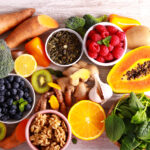Lower blood pressure naturally with THESE 3 foods
 (NaturalHealth365) High blood pressure, a major risk factor for heart disease and strokes, affects a whopping 46 percent of American adults. Also known as hypertension, high blood pressure is characterized by readings that rise above 130/80 mm/Hg. Doctors typically treat high blood pressure with pharmaceutical drugs such as beta-blockers, diuretics, and ACE (angiotensin-converting enzyme) inhibitors. And, while these medications may be required (in some cases for a short period of time), most people are unaware of the toxic side effects.
(NaturalHealth365) High blood pressure, a major risk factor for heart disease and strokes, affects a whopping 46 percent of American adults. Also known as hypertension, high blood pressure is characterized by readings that rise above 130/80 mm/Hg. Doctors typically treat high blood pressure with pharmaceutical drugs such as beta-blockers, diuretics, and ACE (angiotensin-converting enzyme) inhibitors. And, while these medications may be required (in some cases for a short period of time), most people are unaware of the toxic side effects.
The good news is that a variety of tasty foods and spices (which may even be in your refrigerator right now) can help you lower blood pressure naturally.
In fact, a recent article found that diets rich in certain fruits and vegetables can contribute to healthier blood pressure. Let’s look at three appetizing choices that can help to get your blood pressure measurements heading in the right direction.
Anthocyanin-rich, colorful berries and juices help lower blood pressure
Vividly colored berries, such as blueberries, blackberries, raspberries, strawberries, and cranberries, are rich in anthocyanins, natural plant pigments with antioxidant and anti-inflammatory properties. These helpful compounds can increase beneficial nitric oxide levels in the blood, helping to relax arteries and lower blood pressure. Berries are also high in potassium, which helps to ease hypertension. In a recent review of studies published in the European Journal of Nutrition, the authors confirmed that berries caused reductions in systolic (the upper reading) blood pressure. While the reductions were modest (about 3 mm/Hg), these decreases can be meaningful, especially in conjunction with other dietary changes and regular consumption of blood pressure-friendly foods.
When it comes to hypertensive effects, it seems to make little difference whether the berries are enjoyed fresh, frozen, or juiced. By the way, cranberry juice had the most noticeable effect, thereby showing – in this study at least – that it provides the most “bang for the buck.” For maximum benefit, make sure to opt for 100 percent pure, unsweetened cranberry juice. And, be sure to choose organic berries whenever possible or practical.
Crank up the flavor and reduce blood pressure with herbs and spices
Just because a food is good for you doesn’t mean that it has to taste bland. A mouth-watering array of seasonings and spices can help tame hypertension while sparking up the flavors in a meal. Celery seed, cilantro, cinnamon, ginger, oregano, black pepper, chili powder, basil, ginseng, garlic, and turmeric are all known to help combat hypertension. In one eye-opening new study published in the prestigious American Journal of Clinical Nutrition, 71 people with risk factors for heart disease seasoned their food with 1.3 teaspoons of a mix of 24 different herbs and spices daily. (Another group used half of that amount). After four weeks, the “super-spicy” group had lower blood pressure when compared to those who received smaller amounts!
And there’s an additional benefit to spicing things up – herbs and zesty seasonings appear to cause people to use smaller amounts of sugar and salt. In an interesting sidelight, the researchers noted that seasoning vegetables with herbs and spices increased the selection of vegetables in university cafeteria settings. In other words, tasty herbs and spices seem to make people more likely to bypass the salt shaker and sugar bowl while simultaneously choosing healthier fare. That’s a win/win!
Carrots help support healthy blood pressure levels
These cheerful-looking orange root vegetables are high in a pair of antioxidant carotenoids, or plant pigments, known as lutein and zeaxanthin. A 2023 study found that the risk of hypertension dropped by 10 percent for every 100-gram serving of carrots (about a cup) eaten daily. This helps to reinforce an earlier animal study published in Nutrients, which showed that a carrot-enriched diet decreased both triglycerides (fats in the blood) and total blood pressure. That’s not surprising, as a single medium-sized carrot provides almost 10 percent of the recommended daily amount of potassium, which lowers blood pressure by relaxing artery walls.
Of course, these three foods aren’t the only blood pressure-friendly superfoods in town. Holistic doctors and nutritionists say that bananas, citrus fruits, watermelon, leafy greens, beetroot juice, legumes, tomatoes, oats, and kiwi fruit are also great choices.
Ward off hypertension with natural techniques
If you have hypertension (or simply want to avoid developing it in the first place), it makes sense to eliminate or sharply reduce your intake of sodium, added sugars, and factory-farmed (contaminated) fats. Getting sufficient exercise, steering clear of excessive alcohol consumption, and banishing cigarettes are also wise steps to take.
When it comes to maintaining healthy blood pressure, the Mediterranean diet is hard to beat. This healthy way of eating includes plenty of fruits, vegetables, legumes, nuts, and whole grains, along with beneficial fats from olive oil, antioxidant spices, and limited quantities of lean protein.
It’s also important to stay hydrated with plenty of pure, filtered, or sparkling water. Other good beverage choices include fresh beet juice, lemon water, and cranberry juice.
Remember, no single food or combination of foods can lower blood pressure overnight. But, with a little effort, in just a few days the changes can be significant. Finally, an important note, don’t stop taking prescribed medication unless your doctor advises you to.
Bottom line, over the long haul, a healthy (organic) diet and sensible exercise routine can be just the thing to create positive blood pressure readings.
Sources for this article include:
NIH.gov
MedicalNewsToday.com
Healthline.com
NIH.gov
Springer.com
NIH.gov
VeryWellFit.com
Cambridge.org



